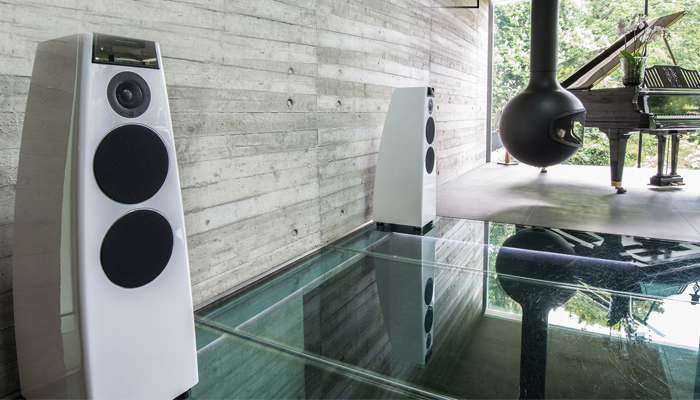Wikipedia defines an audiophile as a person enthusiastic about high-fidelity sound reproduction. It continues to explain, audiophile values may be applied at all stages of music reproduction: the initial audio recording, the production process, and the playback, which is usually in a home setting. A key goal of audiophiles is to capture the experience of a live musical performance in a room with good acoustics, and reproduce it at home. It is widely agreed that this is very difficult and that even the best-regarded recording and playback systems rarely, if ever, achieve it.
Sound & Vision editor Rob Sabin gave an interview recently that revealed the allure and science behind creating an authentic audiophile experience. In the interview, he suggests audio qualities that everyone should be looking for to maximize their listening experience. Read his thoughts below, and if you have questions about designing an audiophile level sound system, feel free to contact one of AHT’s professional audio advisors for more suggestions and advice.
Your source matters
“People are consuming music quite differently these days. We’ve gone away from the traditional component stereo system toward things like sound bars and multi-room wireless speakers fed by Bluetooth straight from your phone.
“But there’s a bottom-line rule for all of audio. It’s this: Garbage in, garbage out. Many people are listening to digital music, streaming low-resolution audio from Pandora and Spotify. On the other side of that is the trend toward high-resolution audio, but the cost of the software and the music itself is keeping it out of reach to the mass-market consumer. But if you’re looking to listen at that level, you can now purchase high-quality digital tracks that are effectively the same recordings that were signed off on by the studio. Even the higher-quality premium streams from Pandora are a better option. Those will have the best potential to give you a great listening experience. So start by paying attention to what you’re listening to, and then pay attention to the chain of equipment.”
A great DAC will save your tracks.
“Another new category that can really shape your listening experience for the better is the stand-alone two-channel system with Bluetooth. These new systems combine an integrated amplifier and a high-quality digital-to-analog converter. Every device playing digital files — your computer, your smartphone — has a DAC to convert signals to the analog feeds that speakers and headphones can play. Those have a tremendous effect on sound quality. With a good DAC, you’ll notice a significant boost in quality — especially when streaming over Bluetooth. They’re relatively small, compact systems — one example is the TEAC AI-301DA, and NAD has a great one, too, its D-3020 — that, when combined with a pair of decent bookshelf speakers, will give you a great basic stereo. They’re compatible with high-res files, and can also be used with your television.”
Speakers are an art.
“If the company cares about sound, you’ll see it in the speakers. What drivers are selected? How well braced and stiffened are the housings? That can cause vibration and therefore affect the music quality. Is there a technical explanation for what it’s doing? That doesn’t necessarily guarantee natural and neutral-sounding speakers, but it does show they care about audio quality.
“Ultimately, speaker design is more of an art form than other elements of the system, and you’ll often see a lot of the designer’s personality in the product. Some will try to be neutral in the frequency balance, others will provide a bump in the upper bass area to sound fuller. Inexpensive speakers, on the other hand, will exaggerate high-frequency sound, to give sizzle and make things like cymbals and horns jump out at you. But neither is great for long-term fatigue-free listening.”
Fatigue will make your ears tired.
“That’s really the ultimate goal: fatigue-free listening that’s not hard on the ears. When you have a system that exaggerates certain parts of the frequency spectrum, that creates distortion, via the amplifier not playing cleanly at whatever volume you’re listening to. That makes it tiresome to listen to for two, three hours straight. You get a headache, you grit your teeth, and it doesn’t make you feel good.
“But great systems will have beautiful sound qualities — combinations of everything done right. A great system can create magic emotionally, and viscerally engage you with the music. It’s why audiophiles become audiophiles. You feel your blood starting to flow, and you’re reaching for your stack of CD’s to see what you’ll hear differently, or how it will make the music feel better. You can listen for hours on end without feeling you have to turn it off and get out of the room.”
Your sound needs a stage.
“It’s important that your sound system has well-constructed staging. There should be width, height and depth. You should be able to hear instruments coming from different directions. If someone steps into the room with you, they should sense that there’s a vocalist in there.”
7Transparency makes your gear vanish. “You also want a level of transparency to sound. This has to do with choices made in how everything works together, and it manifests itself by the ability to project sound into the room in a distortion-free, low-noise way. The equipment should fall away, with no sense of sound localizing. At that point, the music envelopes you and feels lifelike.”
Trust the market.
“One of the biggest mistakes people make when buying audio products is not spending their money in the right place. Don’t listen to marketing or pay attention to the products’ appearance, but do research into what you want and how other consumers are reacting to the product. That’s the beautiful thing about the web. There’s a lot of different places to do research, from magazines like ours — at the risk of sounding self-serving — to user reviews on Amazon to articles on About.com. If legitimate reviews say it’s the best compact Bluetooth player ever, you can be pretty confident that’s based on audiophile sensibilities.”
Have Questions?
Contact an AHT audio adviser by clicking the link below.
Contact Us



